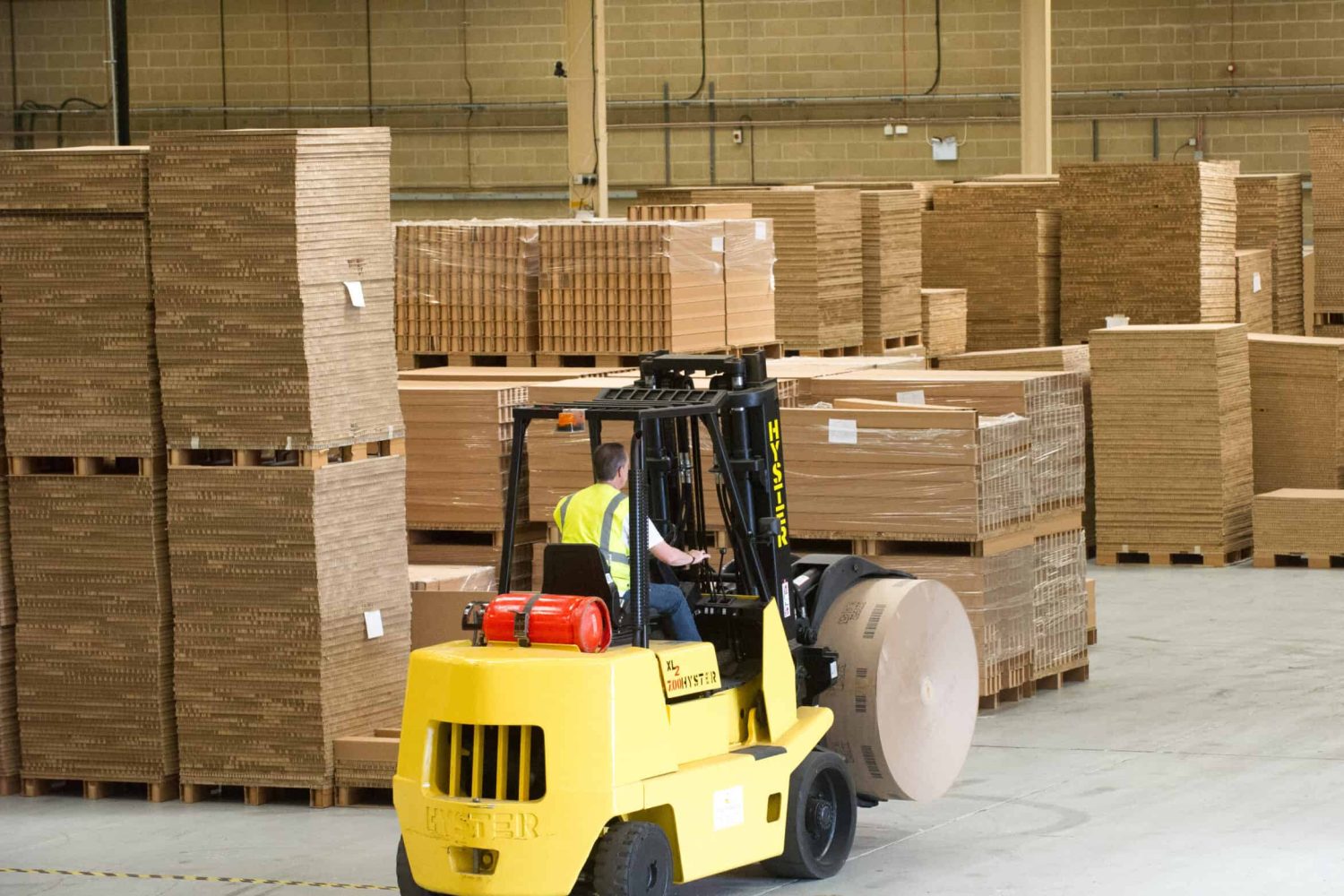Plastic packaging’s days are numbered.
No longer does its low cost, flexibility and convenience outweigh the serious concerns about the environmental damage it causes during production, use and at end of life.
In 2023, we want to be doing better. Businesses want to be more sustainable. Customers expect it, and so do investors, regulators and other important stakeholders.
But plastic packaging has been in use for a long time, and continues to be used by many businesses. In this blog, we look at the scale of the problem as it stands, and the steps businesses can take to play their part in overcoming it.
Removing plastic from the supply chain: The plastics problem
Around 400 million tonnes of plastics is produced globally every year, including an estimated FIVE TRILLION plastic bags (Source: The Sustainability Management School). Around 40% of the plastics produced are for use in packaging.
Plastics production depletes the earth’s natural oil and gas reserves, and is extremely polluting.
What’s more, much of the plastic we produce is designed to be used once and thrown away – so-called ‘single-use plastics’.
The problem with this is that, globally, only nine per cent of the plastic that has EVER been produced has been recycled. Around 12 per cent has been incinerated, but that still leaves a whopping 79 per cent which can still be found in landfill or littered in the environment.
This causes massive issues, because most plastics are not biodegradable, instead taking hundreds of years to break down into micro-plastics that contaminate the soil and leak into water courses, polluting our rivers and seas, and poisoning marine life.
As the world’s population grows, it has been estimated that plastics waste could increase to 3.4 billion tonnes by 2050. This would have disastrous consequences for our planet.
Scientists already estimate that around 11 million metric tonnes of plastic ends up in the ocean each year, adding to the estimated 200 million metric tonnes already circulating in our waters. That’s the equivalent of dumping one garbage truck full of plastic into the ocean every minute (Source: Ocean Conservancy®).
By 2050, that could mean there is more plastic in our oceans than fish.
Removing plastic from the supply chain: Legislative pressure
With all this in mind, it isn’t surprising that governments worldwide are legislating to ban single-use plastics and to encourage businesses to design plastic waste out of the supply chain.
In the EU, the new Corporate Sustainability Reporting Directive (CSRD) being phased in from 2024 will increase scrutiny on businesses when it comes to sustainability considerations like social responsibility and environmental protection. Sustainable packaging will be part of the equation for affected businesses increasingly conscious of and looking to reduce their negative environmental impact.
In the UK, the extension of Producer Responsibilities law means eligible businesses are now required to report on their packaging waste, and to pay a fee to cover the cost of managing their packaging at end of life. By requiring businesses to collect and report data on the make-up, supply, use, sale, hire, loan, recycling, reuse and disposal of their packaging, and by penalising the worst performers, the regulations aim to incentivise recyclability and reuse of packaging and encourage packaging producers to take greater care over the environmental impact of their products.
Removing plastic from the supply chain: A more sustainable solution
At PALLITE® Group, we believe the answer to the plastic packaging problem lies in paper. That’s why all our sustainable packaging products are made from just that and some PVA glue.
Paper is an incredibly versatile material. We use it to manufacture pallets, shipping crates, protective packaging, sustainable void fill and even warehouse shelving units!
Responsibly sourced recycled paper – which is what we use in all our products – is also a sustainable material, taking 70% less energy and water to manufacture than creating virgin paper from trees, and producing 40% less harmful emissions.
What’s more, it is 100% recyclable after use. In fact, paper is the most widely recycled material in the world. In the event it is mistakenly sent to landfill, it breaks down quickly into the environment, leaving no trace and causing no harm in the process.
(Incidentally, the PVA glue we use to seal our paper honeycomb cardboard packaging products is also planet friendly and biodegradable…)
Removing plastic from the supply chain: Our six-step guide
Here’s our six-step guide to how businesses can use PALLITE® products to help remove plastics from the supply chain.
Step #1: The PALLITE® pallet
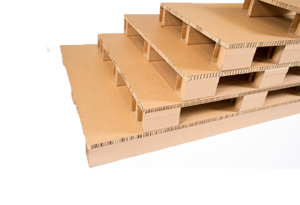
Swap plastic pallets for our sustainable pallets made from recycled paper and food-safe PVA glue.
Lightweight yet incredibly strong, they contain no nails, screws or other fixings and have a low moisture content, making them highly resistant to mould. A clean alternative to plastic pallets for food transport and pharmaceutical operations. Find out more.
Step #2: The PALLITE® shipping crate
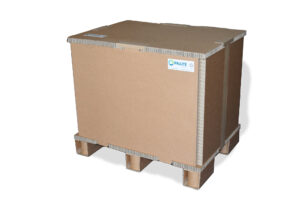
Switch away from plastic shipping crates to the PALLITE® pallet box. Even lighter in weight yet just as strong and clean, our 100% recyclable shipping crates come flat-packed, are quick to assemble, and collapse down again flat after use. Find out more.
Step #3: Sustainable protective packaging
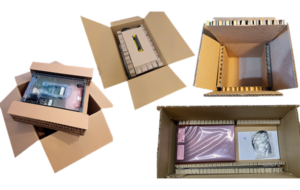
Replace polystyrene and foam protective cradles and inserts with EcoLITE, our 100% recyclable honeycomb paper cardboard alternative.
A recognised construction technology originating in nature and used in automotive manufacturing and furniture craft among other areas of industry, the honeycomb shape provides pound-for-pound stronger than steel, space efficient rigidity and strength to absorb shocks and impacts.
Available in a range of sizes and thicknesses to suit individual requirements, EcoLITE can be provided on pallets by the sheet for tearing to size as needed, or quickly, easily and cost-effectively cut to bespoke designs. Find out more.
Step #4: Sustainable void fill
The flexibility and simplicity of EcoLITE means it can also be used as environmentally friendly void fill, in place of foam packing peanuts, polystyrene and the like.
EcoLITE gains an edge over other sustainable void fill, such as scrunched recycled paper, thanks to its ease of storage, potential for re-use and the added protective properties of the honeycomb structure.
Step #5: Sustainable warehouse storage
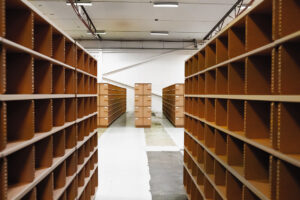
Replace metal racking and plastic pick bins with our PIX® warehouse pick faces, made from 100% recycled honeycomb paper board that slots together quickly and easily without the need for any tools or fixings. Find out more.
Step #6: Ask for help
Got a packaging problem you need help to overcome? We are always innovating and looking to add new products to our range – and we love a challenge! Why not get in touch to see if paper packaging could be the answer to that problem?
Find out more about how switching to PALLITE®’s sustainable packaging products could benefit your business: Get in touch.
